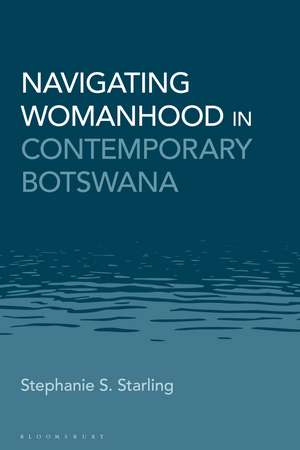Navigating Womanhood in Contemporary Botswana
Autor Stephanie S. Starlingen Limba Engleză Hardback – 4 oct 2023
Preț: 509.52 lei
Preț vechi: 730.70 lei
-30% Nou
Puncte Express: 764
Preț estimativ în valută:
97.53€ • 105.97$ • 81.98£
97.53€ • 105.97$ • 81.98£
Carte tipărită la comandă
Livrare economică 22 aprilie-06 mai
Preluare comenzi: 021 569.72.76
Specificații
ISBN-13: 9781350356689
ISBN-10: 1350356689
Pagini: 200
Dimensiuni: 156 x 234 mm
Greutate: 0.45 kg
Editura: Bloomsbury Publishing
Colecția Bloomsbury Academic
Locul publicării:London, United Kingdom
ISBN-10: 1350356689
Pagini: 200
Dimensiuni: 156 x 234 mm
Greutate: 0.45 kg
Editura: Bloomsbury Publishing
Colecția Bloomsbury Academic
Locul publicării:London, United Kingdom
Caracteristici
Takes an interdisciplinary approach, drawing on sociology, anthropology, gender studies, international development, and African literature, underpinned by feminist methodology throughout
Notă biografică
Stephanie S. Starling is Chief of Staff at Justice Defenders, an NGO providing legal practice, education, and training to prisoners in Africa. She was previously Head of Research for a major data journalism studio specialising in international development trends.
Cuprins
AbstractAcknowledgmentsChapter One - "Inferior in every way to a man": Women in BotswanaChapter Two - Research Design and Methodology in Cross-Cultural InterviewingChapter Three - "If you look at a woman you see a mother": Achieving WomanhoodChapter Four - "I keep on feeling like they take advantage": The Costs of WomanhoodChapter Five - "The life of women has changed very, very much": Womanhood in TransitionChapter Six - "No men ever worked harder than Batswana women": ConclusionsReferencesAppendix: Participant Details
Recenzii
A contemporary approach to the ethnography of gender in southern Africa, this book makes an important contribution through its exploration of the intersections between gender, fertility, and personhood in Botswana. It illustrates the precarity and positionality of women in this region and the need for ethnographic understandings of the lived experiences of those with whom we work.
A necessary and beautiful book that delves deep, with such tact and academic rigour, into contemporary womanhood in Botswana by centring the women's narratives. By analysing, and exposing the intricate bi-legal, historical, societal and gendered interconnections, the book illuminates the complexities and contradictions of Black Batswana womanhood without being universalistic.
Stephanie's book is a fluent, compelling, challenging read. The experience of navigating womanhood that she sets out is filled with pain and unachievable standards. Whilst Stephanie explores some of the ways in which attitudes towards womanhood are changing, it seems that change comes very slowly.
Written in an accessible and captivating manner this book weaves the story of Batswana women through multiple facets of their lives. It brilliantly amplifies the voices of the women telling their stories in their own words. Although written about Botswana, it is very much the story of all African women and indeed many aspects will resonate with women across the world. While acknowledging the positive strides made so far, it also captures the ground that is yet to be won. A must read for all gender and development practitioners, students and women everywhere.
This book is an outstanding contribution to our knowledge of the construction of womanhood in a particular context and location while also contextualising it for women worldwide. It is an in-depth, scholarly study, nevertheless written in clear, accessible English and has my warmest recommendation for readers to further their understanding of the subtleties of gender construction and the implications for diverse women's lives.
A necessary and beautiful book that delves deep, with such tact and academic rigour, into contemporary womanhood in Botswana by centring the women's narratives. By analysing, and exposing the intricate bi-legal, historical, societal and gendered interconnections, the book illuminates the complexities and contradictions of Black Batswana womanhood without being universalistic.
Stephanie's book is a fluent, compelling, challenging read. The experience of navigating womanhood that she sets out is filled with pain and unachievable standards. Whilst Stephanie explores some of the ways in which attitudes towards womanhood are changing, it seems that change comes very slowly.
Written in an accessible and captivating manner this book weaves the story of Batswana women through multiple facets of their lives. It brilliantly amplifies the voices of the women telling their stories in their own words. Although written about Botswana, it is very much the story of all African women and indeed many aspects will resonate with women across the world. While acknowledging the positive strides made so far, it also captures the ground that is yet to be won. A must read for all gender and development practitioners, students and women everywhere.
This book is an outstanding contribution to our knowledge of the construction of womanhood in a particular context and location while also contextualising it for women worldwide. It is an in-depth, scholarly study, nevertheless written in clear, accessible English and has my warmest recommendation for readers to further their understanding of the subtleties of gender construction and the implications for diverse women's lives.
